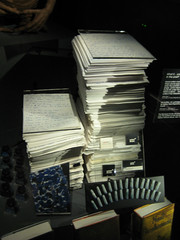. . . to be sung to the tune of "It's My Party."
A few days ago, I posted a rant in response to the Jonah Lehrer screw-up. As far as rants go, it was par for the course around here, including my use of various, um, various informal words.
One of my Facebook friends told me that her father-in-law read it and questioned my need to use the “vernacular,” as he phrased it. (“Vernacular” being a classy term for words like fuck, hell, and shit.) He said that he didn’t think a “good historian” needed to rely on such language. (*1)
He’s got a point: No one needs to rely on the word “fuck”; or words of more than two syllables when a one-syllable word will do; or on name-calling or on, well, whatever they rely on.
But his comment got me thinking about this blog and my philosophy, such as it is, of blogging. ("Philosophy." Now there's a sophisticated word! Probably too high-blown to be used for such a mundane purpose here.) And it occurred to me that it might be useful, six years into blogging, to explain why this blog takes the form it does.
In my verrrrry first blog post, back in 2006, when (being honest) I was dragged, kicking and screaming into blogging, I explained that I regarded my blog as an “observation post,” from which I planned to comment on the world around me. (*2) (*3)
And for better or for worse, that’s what I’ve done for the past six years. (*4)
So that’s one purpose of this blog: On any given day, I talk about whatever is on my mind, a luxury that writing single-topic books doesn’t otherwise offer. Blogging allows me to flex my brain and my writing muscles and to think out loud, if you will.
But over the past six years, I’ve also arrived, inadvertently and unintentionally, at another conclusion about my blogging philosophy (there's that word again . . .), a conclusion inspired primarily by comments like the one from my Facebook friend's father-in-law (because he's not the first to question my choice of language):
My blog (and the website in which it’s embedded) are extensions of my “real” home in the 3-D world. When you stop by this website, you’re sitting in my online living room.
Which means: This is MY house and by god, I can do whatever I want here. I can say what I want. Use whatever words I want to use.
Which, sigh, is also against the “rules”: read advice on how-to-blog, and you’ll usually find a whole lot of verbiage about the need to “be professional.”
To which I say: screw that. I’m professional as hell in my professional life: When I’m researching my books and most especially when I’m writing my books, I'm ALL business.
But when I’m here, well . . . this is the other side of my life. Here, I'm more or less off-duty. So what you get is me, at home, unedited.
And if someone doesn’t wanna hang out in my living room because of a) my use of the “vernacular”; b) my political views; or c) because I’ve got my feet up on the coffee table and I’m ranting at the top of my voice --- well, hey! Here’s my advice:
Sit in someone else's living room.
But if you can take me as I am (cue Joni Mitchell!), then please, stick around. Take a seat. I’ll grab you a beer.
Because I’m happy (as hell) that you’re here.
____________
*1: Perhaps this is a good time to explain my admittedly foul mouth: I am a woman of few vices. I don’t cheat on my spouse or my taxes. I don’t drink to excess. I smoke pot in limited quantities. I don’t smoke cigarettes. I’m a good person. Swearing is my one, my only vice. It dates back to when I was fourteen and looking for some way to “rebel” (because I was such a good kid that I couldn’t imagine doing anything TRULY rebellious). So I started to swear. God, it felt great! Then I spent fifteen years waiting tables, and I’m here to tell you that if there is any other profession more likely to provoke, inspire, and require the use of four-letter words, I want to know what it is. So there you have it: My History Of Swearing.
*2: Even now, six years later, it STILL cracks me up to think of posting that blog entry. In effect, I was sending words out into the cosmos knowing full well that NO. ONE. was reading them. There was something about it that absolutely tickled my sense of absurdity, and still does. Except now I send these words out to five, count ‘em FIVE, people. Progress, people, progress!
*3: I did NOT want to blog, which, at the time, I regarded as the ultimate in narcissism, but felt pressured to do so as a way to boost my writing career). (Ask any writer: we’re ALL being pressured to use Facebook and Twitter, to blog, etc. Good thing I LIKE that stuff.) Now, alas, I'm addicted to blogging. Which, whoops! means I DO have a vice. (See *1 above.)
*4: Which means, yes, I’m a Truly Stupid Blogger, because the “rules” of blogging are that bloggers should keep their content focused and “relevant” to whatever their specialty happens to be. Eg, economists should write about economics; beer people should write about beer; I should stick to history. What can I say? No one will EVER accuse me of being smart.

